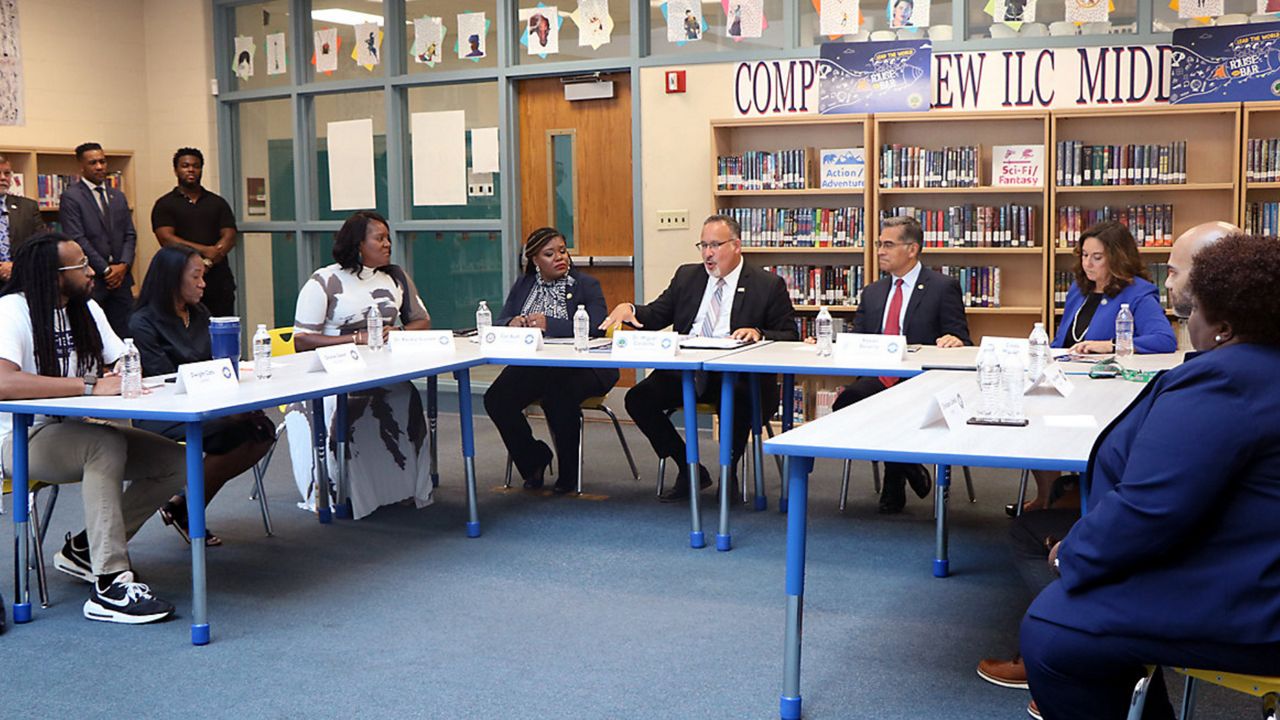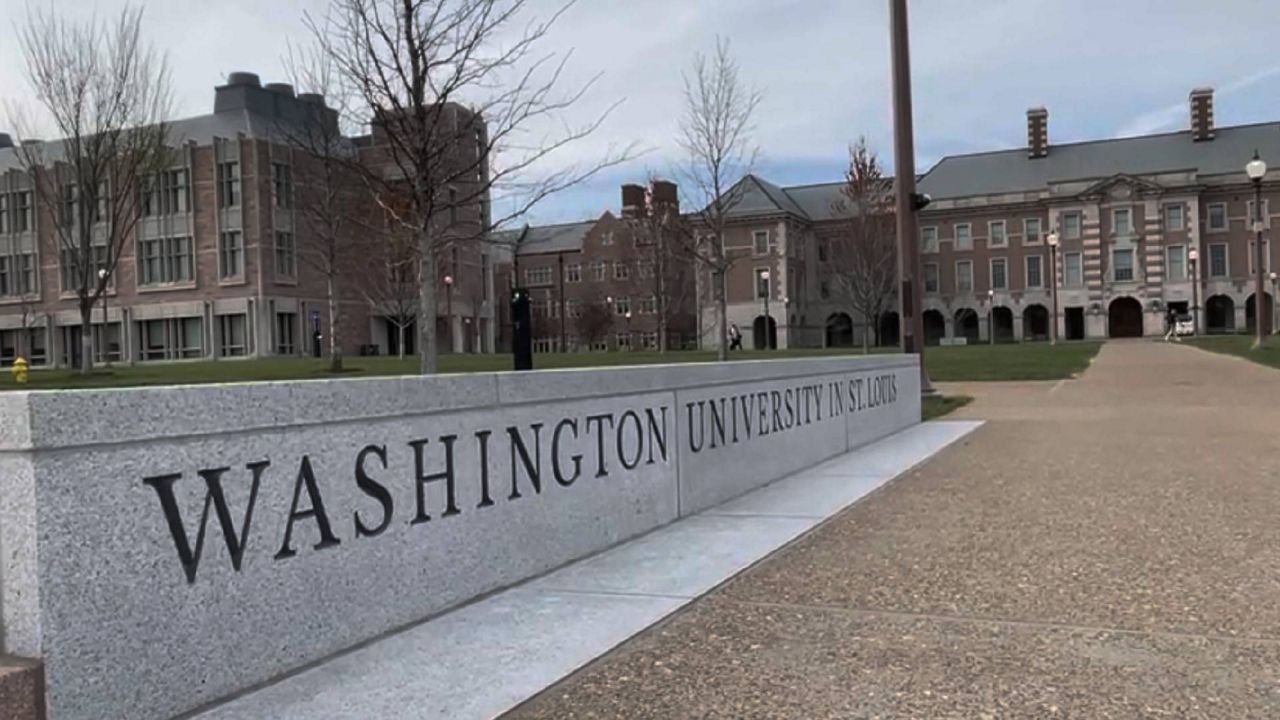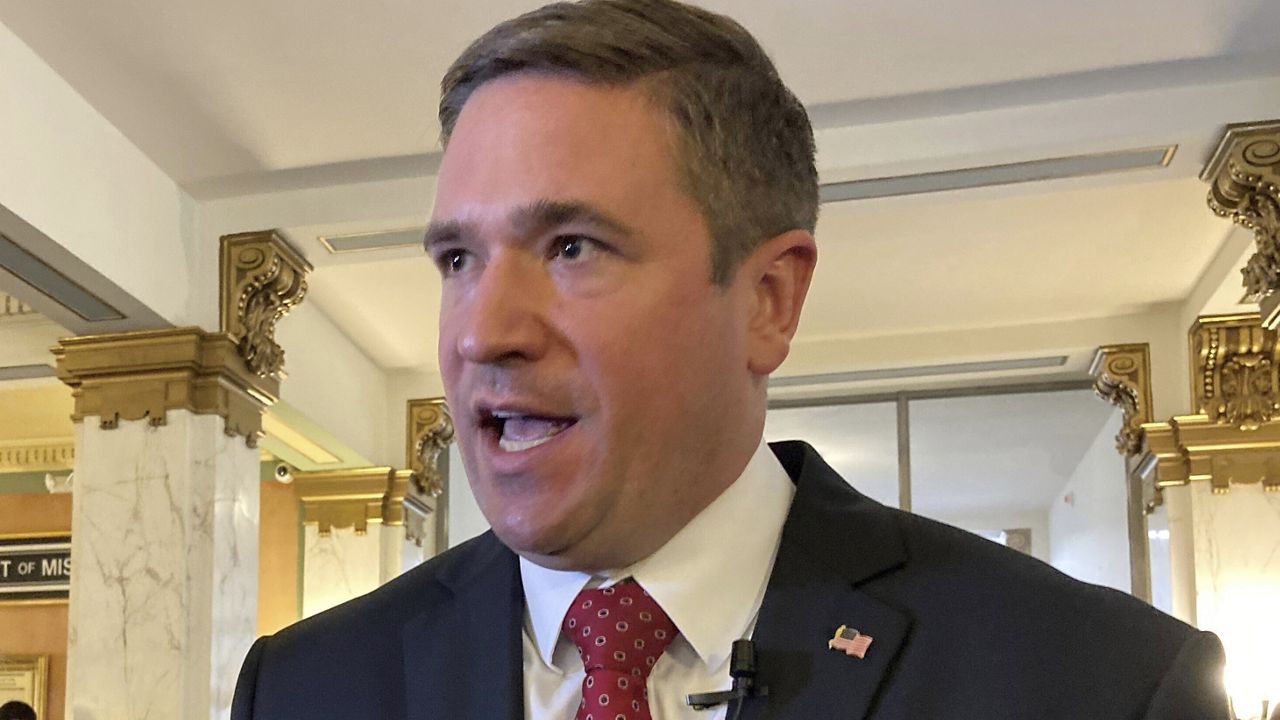ST. LOUIS — Compton-Drew Middle School experienced a 60% decline in suspensions last school year thanks to programs such as the mental health classroom, and federal officials Wednesday got to see it in action.
During his “Raise the Bar” bus tour, U.S. Secretary of Education Miguel Cardona stopped in St. Louis where he not only learned about Compton-Drew’s mental health classroom, but held a mental health roundtable with school staff.
He was joined by U.S. Secretary of Health and Human Services Xavier Becerra, U.S. Deputy Secretary of Education Cindy Marten, U.S. Rep. Cori Bush and St. Louis Public Schools Superintendent (SLPS) Keisha Scarlett.
“We understand St. Louis has so many needs and because of the disparities, because of where we were pre-COVID and then what happened during COVID, we know that those needs were exacerbated,” Bush said. “(Cardona and Becerra) are here to talk about how we can raise the bar because students deserve it and St. Louis deserves it.”
Equipped with a massage chair, a punching bag, a TV and gaming system, and more, the mental health classroom is where students can destress. After five years of hard work by Moore, the mental health classroom was implemented last school year.
Activities such as yoga also are offered to students and once a week, a section of the classroom turns into a school store run by students, according to Tracey Moore, school social worker.
With staff always in the classroom, students may be sent to the mental health classroom for a break or they can request to go themselves.
The school also has a Positive Behavior Support Interventions and Support program (PBIS) where a positive behavior intervention specialist oversees students and rewards them for displaying positive behavior.
Moore said students want to come to the mental health classroom, which is a work-in-progress to becoming a welcoming space.
“It has decreased some of the behaviors, not 100%, but it’s decreased some behaviors,” she said, adding Dolphin tickets that students can cash in for rewards have been helpful too.
Moore told Spectrum News that art students will paint the classroom’s cabinets and after they graduate from 8th grade, they will have a chance to leave their handprint on the cabinets or leave behind a sand art piece.
When students returned to school after the COVID-19 pandemic, principal Susan Reid said she saw a significant increase of negative behavior. After investing more in students’ mental health and focusing on how they were healing post COVID, she said the school’s suspension rate decreased by 60%.
“The students were responding to us responding to their needs,” Reid said.
Moore and Reid joined federal officials in the mental health roundtable along with Dwight Cato, Froebel Literacy Academy Elementary School counselor, Desiree Speed, Gateway Stem High School head counselor, and Christiaan Cofield, counselor at Pamoja Preparatory Academy.
SLPS staff shared some of the challenges they face when helping students, such as lack of mental health support, resources and positions such as school nurses.
They also mentioned the hardships students face, including poverty, bullying, social media, lack of sleep at night, losing a family member, not feeling safe at school, and more.
Moore said she would like to see an end to standardized testing, which brought applause from teachers who were in the audience. Cato agreed, mentioning the struggles students have with the tests based on how it is presented to them, among other issues.
“I think what we learned today, schools are not just about education. More and more they’ve become a place for help. It is hard to learn if you are hungry. It is hard to learn if you are unhoused,” Becerra said.
“We want to join with the Department of Education at the Department of Health and Human Services to make it clear, our kids should be able to learn.”
Becerra said he hopes schools will not have to use their education budget to provide a counselor, social worker or therapist, but get funds directly from healthcare.
“We cannot go back to what we had before the pandemic. Our kids are resilient, but we need to do better. We have to make sure we’re raising the bar not only in academics, we have a lot of work to do there, but we also have to make sure that they’re well,” Cardona said.
“What we heard from the educators here today, just reinforces what we’re fighting for in this administration, providing more mental health support, ensuring our students and staff have enough support when they’re not well.”
Cofield told Spectrum News that he was honored to be a part of Wednesday’s panel.
“It means that they care. It means that they are willing to listen. It means that they are willing to put in the effort to get us what we need,” he said.
Speed said she was excited that they were at Compton-Drew to hear their challenges and strides.
“The country is huge, so for them to take time out here in St. Louis, it means a lot,” she said.
Moore said she hopes some legislation will come from the roundtable, including doing away with standardized testing and having SLPS receive funds that Cardona said are available.
Additionally, Moore hopes that the No Child Left Behind Act is changed.
“We need to focus on revamping the 1950s educational system and bring it up to 2023,” she said. “The Secretary said it, we can’t keep pretty much expecting different results doing the same thing, definition of insane.”
Speed mentioned she would like to see equitable legislation so that mental health services are provided to all schools across the country.









